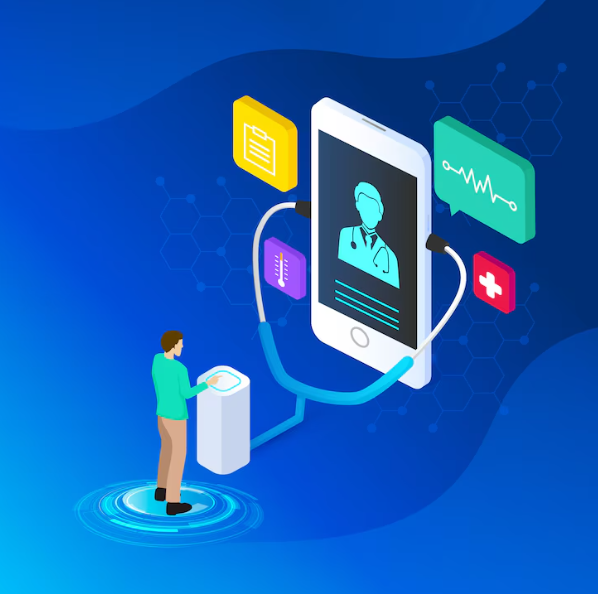The integration of Artificial Intelligence (AI) into healthcare is driving unprecedented innovation, enabling smarter, faster, and more precise medical solutions. AI software development is at the core of this transformation, reshaping how healthcare providers, patients, and researchers interact with technology to address complex medical challenges.
In this blog, we explore how AI is revolutionizing healthcare, its diverse applications, the development process for AI healthcare software, and the transformative benefits it offers.
The Role of AI in Healthcare Innovation
AI has become a vital tool for tackling some of the most pressing challenges in healthcare. By automating repetitive tasks, analyzing vast datasets, and delivering predictive insights, AI empowers healthcare professionals to improve outcomes, reduce costs, and enhance the patient experience.
AI is not just improving efficiency; it’s also redefining the boundaries of innovation by enabling breakthroughs in areas such as:
- Early and accurate disease diagnosis.
- Personalized treatment plans based on individual patient data.
- Drug discovery and accelerated clinical trials.
- Remote monitoring and telehealth services.
By leveraging AI, the healthcare industry is moving closer to providing universal, patient-centric, and value-based care.
Applications of AI Software in Healthcare
1. Diagnostic Accuracy
AI-powered diagnostic tools analyze medical images, pathology slides, and genomic data with high precision. For instance:
- AI algorithms detect tumors, fractures, or retinal diseases with greater speed and accuracy than traditional methods.
- Predictive tools assess patient risks for diseases like diabetes or heart failure based on historical data.
2. Remote Patient Monitoring and Telemedicine
AI enables real-time health monitoring through wearable devices and telehealth platforms. These systems collect and analyze patient data, sending alerts to physicians when anomalies are detected. AI chatbots assist patients with triage, scheduling, and basic medical advice.
3. Drug Discovery and Development
Traditional drug development is a time-consuming and expensive process. AI accelerates this by:
- Simulating molecular interactions to identify potential drug candidates.
- Optimizing clinical trial designs to ensure faster approval cycles.
4. Personalized Medicine
AI software creates tailored treatment plans by analyzing a patient’s genetic information, lifestyle, and medical history. This precision ensures better treatment outcomes and minimizes side effects.
5. Operational Efficiency
Hospitals and clinics are adopting AI to automate administrative tasks such as:
- Appointment scheduling and patient flow management.
- Medical coding and billing processes.
- Optimizing staff allocation and inventory management.
6. Enhancing Mental Health Support
AI tools analyze behavioral data to detect signs of mental health issues. Applications powered by natural language processing (NLP) and machine learning provide therapy support through chatbots or apps, ensuring patients receive care when they need it.
The Benefits of AI Software Development in Healthcare
AI healthcare solutions provide significant advantages, including:
1. Improved Patient Outcomes
- Faster and more accurate diagnostics lead to earlier interventions.
- Real-time monitoring ensures critical conditions are identified promptly.
2. Enhanced Efficiency for Providers
- Automation reduces the administrative burden, freeing healthcare professionals to focus on patient care.
- AI streamlines workflows, minimizing operational bottlenecks.
3. Cost-Effective Solutions
- AI reduces resource waste by optimizing processes such as staffing, scheduling, and inventory.
- Automated analysis cuts the cost of lengthy diagnostic procedures.
4. Data-Driven Decision-Making
Healthcare professionals gain actionable insights through AI’s ability to analyze large datasets, enabling evidence-based treatment decisions.
5. Expanded Access to Care
AI-driven telemedicine and remote monitoring make quality care accessible to underserved or remote populations.
AI Healthcare Software Development Process
Developing AI healthcare software requires a meticulous approach to ensure compliance, functionality, and scalability. The process typically involves:
1. Requirement Gathering
Understanding the client’s needs, challenges, and regulatory environment (e.g., HIPAA, GDPR).
2. Designing the Solution
Developing a user-friendly interface with intuitive navigation for both patients and healthcare professionals.
3. Building the Software
Using AI frameworks like TensorFlow, PyTorch, or Keras to build models tailored to specific use cases. Leveraging cloud platforms such as AWS or Microsoft Azure for scalability and reliability.
4. Testing and Validation
Conducting rigorous testing to ensure the software is secure, compliant, and efficient. Validation includes checking for bias in AI models to ensure equitable outcomes.
5. Deployment and Integration
Implementing the software within existing healthcare infrastructures such as EHR systems. Training staff to maximize the software’s potential.
6. Ongoing Maintenance and Updates
Providing continuous support to enhance the software’s performance and ensure compliance with evolving healthcare regulations.
Challenges in AI Healthcare Development
While AI offers immense potential, developers face unique challenges:
- Data Privacy and Security: Handling sensitive patient data requires robust encryption and compliance with data protection laws.
- Regulatory Compliance: Navigating stringent healthcare regulations is essential for ensuring legal and ethical software use.
- Bias in AI Models: Developers must ensure training datasets are diverse and representative to avoid biased outcomes.
- Integration with Legacy Systems: Many healthcare providers still rely on outdated systems, making seamless integration a challenge.
Future of AI in Healthcare Innovation
The future of healthcare is inseparable from AI. With continuous advancements in machine learning, natural language processing, and robotics, AI is poised to revolutionize areas such as:
- Predictive Healthcare Ecosystems: AI will enable personalized health management by analyzing real-time data from wearable devices, apps, and EHRs.
- Precision Surgery: Robotic surgery systems powered by AI will offer unmatched accuracy and efficiency.
- Global Disease Monitoring: AI will enhance the ability to predict and respond to pandemics through better surveillance systems.
As these technologies mature, they will make healthcare more accessible, affordable, and inclusive.
Choosing the Right AI Software Development Partner
To realize the full potential of AI in healthcare, partnering with an experienced development company is crucial. Look for a partner that offers:
- Expertise in AI and healthcare technology.
- Proven success in delivering compliant, innovative solutions.
- A focus on ethical AI practices, ensuring unbiased and secure outcomes.
- End-to-end services, including ideation, development, deployment, and support.
Empowering Healthcare Through Innovation
AI software development is reshaping healthcare, making it more efficient, accessible, and patient-focused. From improving diagnostics to automating workflows, AI enables medical professionals to achieve better outcomes while reducing costs. By embracing AI-powered innovation, healthcare organizations can lead the charge in delivering exceptional care for the future.
Ready to revolutionize healthcare with AI? Partner with experts to build intelligent, compliant, and transformative software solutions that define the next era of medical technology.




